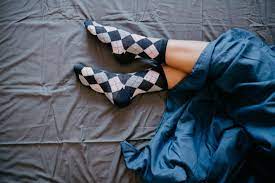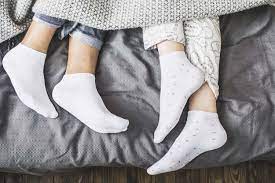Does sleeping with socks affect the brain


Sleep is an essential aspect of our lives, allowing our bodies and minds to recharge and rejuvenate. People often debate various factors that can impact the quality of our sleep, including room temperature, bedding, and sleeping positions.
One topic that has garnered attention is the question of whether sleeping with socks on can affect brain function.
In this blog post, we will explore this intriguing question and shed light on the potential connection between wearing socks during sleep and its impact on the brain.
The Science Behind Sleep Regulation


To understand the potential relationship between wearing socks during sleep and its effects on the brain, it is necessary to grasp the basics of sleep regulation.
READ ALSO: More Grease to Your Elbow Meaning
Our sleep-wake cycle is controlled by an internal biological clock called the circadian rhythm. This clock regulates our sleep patterns, alertness, and various physiological processes.
The circadian rhythm is influenced by several factors, including light exposure, temperature, and melatonin secretion.
When our body prepares for sleep, our core temperature naturally drops. This drop in temperature helps initiate the sleep process and promotes a more restful slumber.
The Role of Feet in Temperature Regulation
Our extremities, particularly our feet, play a crucial role in regulating body temperature. They act as natural heat exchangers, helping dissipate heat and cool down the body.
During sleep, when the ambient temperature is cooler, wearing socks can help retain heat and prevent the feet from becoming excessively cold.
The Relationship Between Warm Feet and Sleep Quality
Several studies suggest that warm feet can promote better sleep quality. When our feet are comfortably warm, it signals to the body that the environment is safe and conducive to rest.
This sensation can trigger a relaxation response, promoting faster sleep onset and deeper sleep stages.
Furthermore, warm feet aid in the dilation of blood vessels, improving blood circulation throughout the body. Enhanced circulation can optimize oxygen and nutrient delivery to the brain, supporting its overall function.
Peripheral Vasodilation and Brain Performance
The concept of peripheral vasodilation, which refers to the widening of blood vessels in the extremities, is connected to brain performance.
When our feet are warm, blood vessels dilate, allowing for increased blood flow. This improved circulation can have positive effects on cognitive function, memory consolidation, and overall brain health.
The Role of Thermal Comfort
Individuals have varying preferences for thermal comfort during sleep. Some people find it difficult to sleep with cold feet, while others may prefer a cooler sleep environment.
The key factor is finding a balance that provides optimal comfort for each individual.
It’s important to note that everyone’s experience may differ, and there may be exceptions to the general findings. Some individuals may find it uncomfortable to sleep with socks on, and this discomfort could potentially affect their sleep quality.
Conclusion
While the topic of wearing socks during sleep and its impact on brain function is intriguing, there is no definitive scientific evidence to support a direct causal relationship between the two.
However, there are plausible connections between warm feet, improved sleep quality, and enhanced blood circulation, which can indirectly contribute to brain performance.
Ultimately, the decision to wear socks during sleep should be based on personal comfort and preference. If wearing socks provides a sense of warmth and comfort, it may contribute to a more relaxed and restful sleep.
However, if it feels uncomfortable or restricts sleep quality, it’s perfectly fine to opt for a sockless slumber.
Remember, sleep is a highly individualized experience, and maintaining a consistent sleep routine, creating a comfortable sleep environment, and adopting healthy sleep habits are key factors in achieving optimal rest and brain function.




